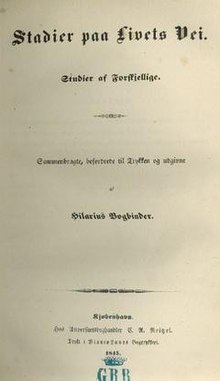Stages on Life's Way

First edition, titlepage.
|
|
| Author | Søren Kierkegaard |
|---|---|
| Original title | Stadier paa Livets Vei |
| Translator | Walter Lowrie, 1940; Howard V. Hong, 1988 |
| Country | Denmark |
| Language | Danish |
| Series | First authorship (Pseudonymous) |
| Genre | Christianity, philosophy |
| Publisher | Bianco Luno Press |
|
Publication date
|
April 30, 1845 |
|
Published in English
|
1940 – first translation |
| Media type | Paperback |
| Pages | 465 |
| ISBN | |
| Preceded by | Three Discourses on Imagined Occasions |
| Followed by | Concluding Unscientific Postscript |
Stages on Life's Way (Danish: Stadier på Livets Vej; historical orthography: Stadier paa Livets Vej) is a philosophical work by Søren Kierkegaard written in 1845. The book was written as a continuation of Kierkegaard's masterpiece Either/Or. While Either/Or is about the aesthetic and ethical realms, Stages continues onward to the consideration of the religious realms. Kierkegaard's "concern was to present the various stages of existence in one work if possible."
But he wasn't satisfied until the completion of Concluding Unscientific Postscript in 1846. Here he wrote: "When my Philosophical Fragments had come out and I was considering a postscript to “clothe the issue in its historical costume,” yet another pseudonymous book appeared: Stages on Life’s Way, a book that has attracted the attention of only a few (as it itself predicts) perhaps also because it did not, like Either/Or, have The Seducer’s Diary, for quite certainly that was read most and of course contributed especially to the sensation. That Stages has a relation to Either/Or is clear enough and is definitely indicated by the use in the first two sections of familiar names." Later in the same book he said,
In Either/Or, I am just as little, precisely just as little, the editor Victor Eremita as I am the Seducer or the Judge. He is a poetically actual subjective thinker who is found again in “In Vino Veritas”. In Fear and Trembling, I am just as little, precisely just as little, Johannes de Silentio as the knight of faith he depicts, and in turn just as little the author of the preface to the book, which is the individuality-lines of a poetically actual subjective thinker. In the story of suffering (Guilty?/’Not Guilty), I am just as remote from being Quidam of the imaginary construction as from being the imaginative constructor, just as remote, since the imaginative constructor is a poetically actual subjective thinker and what is imaginatively constructed is his psychologically consistent production. Concluding Unscientific Postscript 1846, Hong p. 625-626
...
Wikipedia
